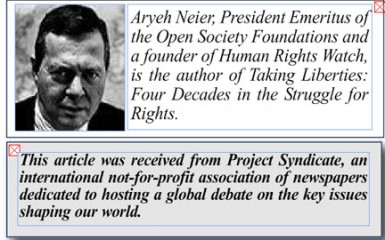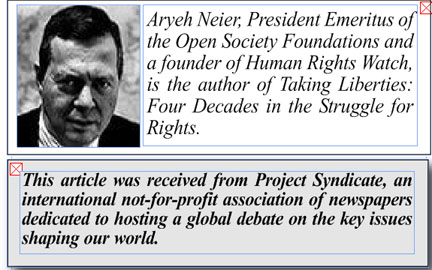By Aryeh Neier
PARIS – “If the law supposes that,” says Mr. Bumble in Oliver Twist, “the law is a ass – a idiot.” For decades, Britain’s libel laws had been living down to Mr. Bumble’s expectations. But freedom of expression worldwide received a boost – and Britain’s reputation for commonsense was somewhat restored – in April, when Parliament adopted legislation revising the country’s libel law.
Previously, corporations and individuals all over the world who claimed that they had been defamed – even if those suing or those who allegedly defamed them had little or no connection to the United Kingdom – would bring lawsuits for libel in the British courts. The practice was widely known as “libel tourism.”

The passage of libel reform is attributable to a campaign launched more than three years ago by three organizations: English PEN, a writers association; Index on Censorship, a bimonthly journal that has monitored censorship worldwide and published the works of censored writers for the past four decades; and Sense About Science, an organization that promotes scientific knowledge and understanding. The targeting of scientific journals and scientists for exposing charlatans was a leading factor in generating public support for reform of the UK’s libel law.
The cases involving science included a costly lawsuit against Nature, one of the world’s best-known and most widely respected scientific journals. Nature had to contend with a libel suit for pointing out that a physics journal had published many articles by its editor, and that these articles had not been subjected to peer review. Though Nature defended itself successfully, the suit cost it a lot of money and tied up many of its staff members for long periods. Other libel suits involved unproven cancer therapies.
The science case that probably played the most significant role in the campaign was a suit filed by the British Chiropractic Association against science writer Simon Singh for and article he published in The Guardian in 2008, in which he discussed “bogus treatments.” Singh won his case, but it cost him dearly in time and legal expenses.
One of the cases that illustrated the kind of “tourism” encouraged by the law involved a suit by a Saudi businessman against an American author who said in her book that the businessman had provided financial support to Al Qaeda. Apparently, 23 copies of the book were sold in the United Kingdom. That provided a sufficient nexus for the British courts to accept jurisdiction.
Though the American author did not hire British counsel and did not try to defend herself in the UK, she was ordered to pay damages, arousing outrage in the United States. The US Congress adopted legislation, signed by President Barack Obama, making such judgments unenforceable in American courts.
The revised British law continues to place the burden of proof on the defence. But the standard that must be met has been changed. The new law permits an author or publisher who is sued to invoke a “public interest” defence. Moreover, corporations, charities, and other institutions filing libel suits will now have to show that they suffered financial damage.
Singh argues that this requirement by itself would have prevented the suit against him by the British Chiropractic Association from going forward. And libel tourism will be drastically reduced by a new rule that excludes suits from outside the European Union if it cannot be shown that the UK is the most appropriate place to bring the case.
British law firms that have apparently made a lot of money representing libel plaintiffs from around the world impeded adoption of the new law through intense lobbying. The scientists, writers, and anti-censorship activists who led the campaign were assisted in Parliament by Lord Lester, a well-known British civil liberties lawyer, who introduced a Private Member’s Bill in 2010, and eventually by endorsement of reform by all three major political parties.
Nearly 400 years ago, in 1644, John Milton published his Areopagitica, an essay denouncing a measure in Parliament for licensing the press that was intended, among other things, to suppress libelous publications. That essay is widely regarded as the start of the worldwide movement for freedom of speech and the press. Last month’s victory by scientists, writers, and anti-censorship campaigners suggests that the movement launched by Milton still has life in his own country.






